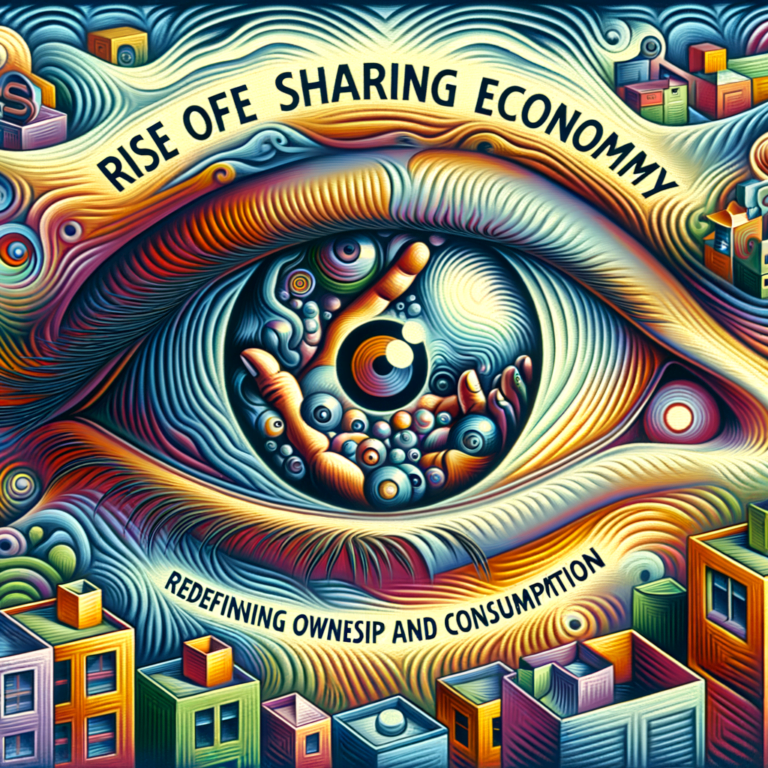Table of Contents
The Rise of the Sharing Economy
Imagine a world where you can access a car with just a few taps on your phone, stay in someone's home instead of a hotel, or even rent out your own belongings to earn some extra cash. This is the essence of the sharing economy, a phenomenon that has been reshaping the way we think about ownership and consumption in recent years.
- What is the Sharing Economy?
The sharing economy, also known as the collaborative economy or peer-to-peer economy, is a socio-economic system built around the sharing of resources, often facilitated by technology platforms. Instead of owning assets outright, individuals can access goods and services on a temporary basis, either for free or for a fee, through online platforms that connect providers with consumers.
One of the key principles of the sharing economy is the idea of access over ownership. Rather than buying a car, for example, you can use a ride-sharing service like Uber or Lyft to get around. This shift from ownership to access has significant implications for how we consume goods and services, as well as how we interact with one another in a more collaborative and sustainable way.
- Examples of the Sharing Economy
There are countless examples of the sharing economy in action, from transportation and accommodation to goods and services. Let's take a closer look at some popular platforms that have revolutionized the way we share resources:
- Ride-Sharing: Companies like Uber and Lyft have transformed the way we think about transportation. Instead of owning a car, you can simply request a ride through a mobile app and pay for the service on a per-ride basis.
- Accommodation: Platforms like Airbnb allow individuals to rent out their homes or spare rooms to travelers, offering a more personalized and affordable alternative to traditional hotels.
- Goods Sharing: Websites like Craigslist and Kijiji enable people to buy, sell, or trade used goods, giving items a second life and reducing waste.
- Task Sharing: Services like TaskRabbit connect people who need help with various tasks, such as cleaning, moving, or handyman work, with individuals willing to provide their services for a fee.
Redefining Ownership and Consumption
The rise of the sharing economy has profound implications for how we view ownership and consumption. By promoting access over ownership, the sharing economy challenges traditional notions of property rights and economic value, leading to a more efficient and sustainable use of resources.
- Impact on Traditional Industries
Traditional industries, such as hotels and taxi services, have been disrupted by the sharing economy. For example, the hotel industry has faced stiff competition from platforms like Airbnb, which offer a wider range of accommodation options at lower prices. Similarly, taxi companies have struggled to compete with ride-sharing services like Uber and Lyft, which provide more convenient and affordable transportation options.
According to a report by PwC, the sharing economy is expected to grow to $335 billion by 2025, up from $15 billion in 2014. This rapid expansion is driven by changing consumer preferences, technological advancements, and a growing awareness of the environmental and social benefits of sharing resources.
- Benefits of the Sharing Economy
The sharing economy offers a range of benefits for both consumers and providers, including:
- Cost Savings: By sharing resources, individuals can save money on purchases and maintenance costs, making goods and services more affordable and accessible.
- Environmental Sustainability: Sharing resources reduces waste and promotes a more sustainable use of natural resources, helping to mitigate the environmental impact of overconsumption.
- Community Building: The sharing economy fosters a sense of community and collaboration, as individuals come together to share resources and support one another in a more interconnected and inclusive society.
For example, in Canada, the sharing economy has gained significant traction in recent years, with platforms like Bunz and Turo becoming popular among consumers looking for alternative ways to access goods and services. According to a study by the Canadian Internet Registration Authority (CIRA), 42% of Canadians have used a sharing economy platform at least once, with 66% of users reporting a positive experience.
As we continue to embrace the sharing economy, it is important to consider the implications of this shift on our economy, society, and environment. By redefining ownership and consumption, we have the opportunity to create a more sustainable and equitable future for all.
I'll end by saying that I'm trying my best to make these subjects understandable and straightforward. As you read, study, and explore further, keep in mind that these little writings are just the beginning. To help you out, here are a few other stories from the world of economics to help you prepare for any eventuality:












xb4kv9